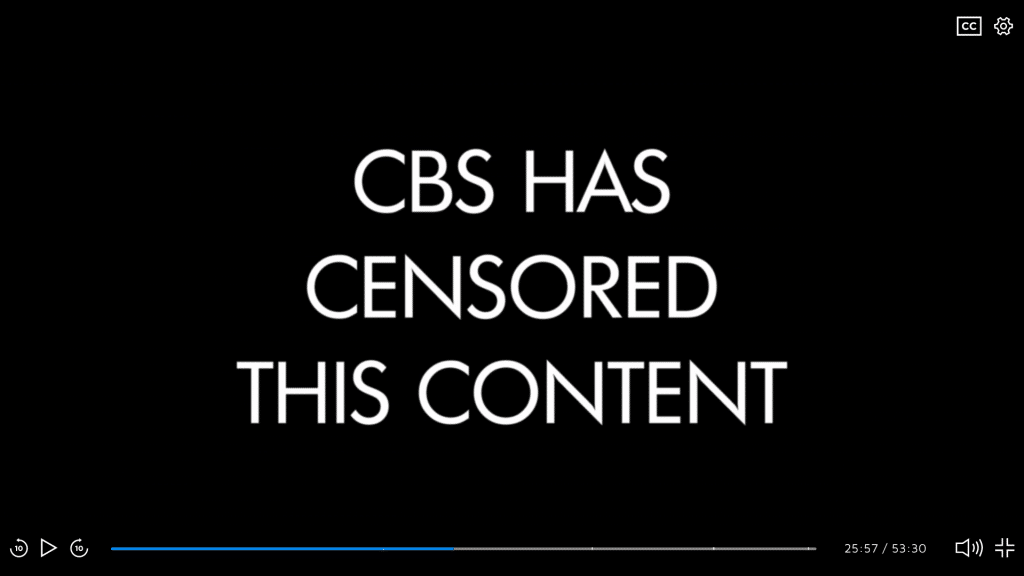An episode of The Good Fight illustrates the clout of China’s censors
By Matt Field | May 10, 2019
 A screenshot taken from The Good Fight on CBS All Access. Credit: CBS All Access.
A screenshot taken from The Good Fight on CBS All Access. Credit: CBS All Access.
A US television show made news this week and it wasn’t Game of Thrones. The Good Fight, a spinoff of The Good Wife, caught the attention of executives at CBS All Access, who had some serious concerns about an episode’s message on Chinese censorship. If aired, an animated musical short included in the episode could jeopardize the safety of executives in China, the executives reportedly thought. The song had to go.
In a compromise with CBS, the show’s producers replaced the offending short with a message reading: “CBS has censored this content.” The Good Fight brouhaha has once again highlighted the effect of Chinese government censorship on US pop culture.
It’s relatively easy to forget that Chinese censors can affect what gets pumped into the US pop culture bloodstream. Among studios, self-censorship is the norm. China’s giant market is just too tantalizing.
Here are some of the movies that illustrate the push and pull among Chinese censors and US studios over the years.
Brad Pitt plays the Austrian explorer Heinrich Harrer who, after a mountain climbing disaster in the Himalayas, spends time in Lhasa befriending a young Dalai Lama. Some critics, like those in the Chinese government, thought the movie was a bust. Harrer may have spent seven years in Tibet, but Columbia TriStar’s movie spent zero time playing in China.
Martin Scorsese took on the early life of the 14th Dalai Lama. Tibetan Buddhists in search of a new Dalai Lama present a young boy with various items, including belongings of the deceased 13th Dalai Lama. When the boy picks out the dead religious leader’s possessions, the Buddhists know they have their man. In capturing the brutality of the Chinese takeover of Tibet in the 1950s, Scorsese helped get Disney booted from China until 1999.
Richard Gere stars in this movie about an American who wakes up in China next to a dead woman and has to fight for his innocence in a rigged judicial system. The film critic Roger Ebert called the movie a “xenophobic travelogue crossed with Perry Mason.” The movie speaks truth to power “so lamely,” Ebert wrote. Did the Chinese Ministry of Radio, Film and Television agree? Because of the Red Corner, the ministry temporarily banned “all business cooperation” with MGM.
In the original 1984 version of Red Dawn, the Soviet Union and Cuba team up to invade the United States. One thing they didn’t plan for? A crew of ragtag teenagers in Colorado spoiling their plans. The 2012 remake involves a North Korean invasion–an even more unbelievable premise. Chinese state media didn’t take particular issue with Red Dawn for having an impossible plot riddled with amateurish inaccuracies, but it didn’t like that the script originally called for a Chinese invasion. In one of the most notable instances of self-censorship in a bid to do business in China, MGM spent $1 million digitally switching out the Chinese force for a North Korean one.
Poor India. When Sony Pictures Entertainment was developing a movie about aliens attacking the Earth with weapons based on Pac-Man and other video games, the studio considered a scene in which the aliens attack the Great Wall of China. A Sony employee nixed the idea because it would not “benefit the China release at all.” The aliens end up attacking the Taj Mahal and other world landmarks. As Reuters noted, “global audiences are effectively being subjected to standards set by China.”
Publication Name: The New Yorker
To read what we're reading, click here
Together, we make the world safer.
The Bulletin elevates expert voices above the noise. But as an independent nonprofit organization, our operations depend on the support of readers like you. Help us continue to deliver quality journalism that holds leaders accountable. Your support of our work at any level is important. In return, we promise our coverage will be understandable, influential, vigilant, solution-oriented, and fair-minded. Together we can make a difference.
Keywords: Brad Pitt, CBS, Censorship, China, Hollywood, Kundun, Martin Scorsese, Pixel, Red Corner, Red Dawn, Seven Years in Tibet, The Good Fight
Topics: Disruptive Technologies, What We’re Reading
















China also banned 2016’s “Ghostbusters” (the most unfairly maligned movie ever) for depicting the dead coming back to life. “The Big Bang Theory” is also banned there.
Were I in charge of a country, I wouldn’t ban movies, TV shows, etc, that I don’t like (i.e., any John Wayne movie). I would just make them carry a disclaimer noting that they’re lying about what they depict.